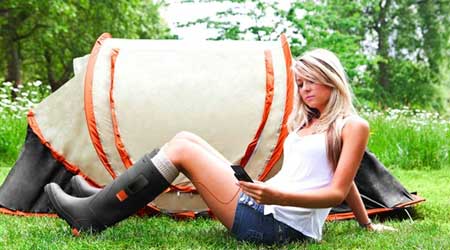 |
|
A girl wearing a pair of power boots. Modern festival-goers who dread ending up with a dead mobile phone battery after days stuck in a muddy field with no electric plug power points may now have a solution -- power boots. |
|
Modern festival-goers who dread ending up with a dead mobile phone battery after days stuck in a muddy field with no electric plug power points may now have a solution -- power boots. Mobile phone company European Telco Orange has introduced a phone charging prototype -- a set of thermoelectric gumboots or Wellington boots with a 'power generating sole' that converts heat from the wearer's feet into electrical power to charge battery-powered hand-helds. The boot was designed by Dave Pain, managing director at GotWind, a renewable energy company. Pain said the boot uses the Seebeck effect, named after physicist Thomas Johann Seebeck, in which a circuit made of two dissimilar metals conducts electricity if the two places where they connect are held at different temperatures. "In the sole of the Wellington boot there's a thermocouple and if you apply heat to one side of the thermocouple and cold to the other side it generates an electrical charge," Pain said. "That electrical charge we then pass through to a battery which you'll find in the heel of the boot for storage of the electrical power for later use to charge your mobile phone." These thermocouples are connected electrically, forming an array of multiple thermocouples (thermopile). They are then sandwiched between two thin ceramic wafers. When the heat from the foot is applied on the top side of the ceramic wafer and cold is applied on the opposite side, from the cold of the ground, electricity is generated. After a full day's festivalfrolics music lovers can plug their phone into the power output at the top of the welly and use the energy generated throughout the day to charge their phone. But the prototype boot does have one drawback. You need to walk for 12 hours in the boots to generate one hour's worth of charge. (Read by Lee Hannon. Lee Hannon is a journalist at the China Daily Web site.) (Agencies) |
喜爱参加节日活动的人再也不用担心被困泥地数日遇上手机没电,而且还找不到地方充电的尴尬情况了——一款充电靴可以解决这个问题。 欧洲移动运营商英国Orange公司最新推出了一款可以为手机充电的热电橡胶靴或惠灵顿长筒靴。这款靴子的底部内嵌发电装置,可将穿鞋者脚部的热量转化为电能,为带有电池的手提装置充电。 这款靴子由GotWind可再生能源公司总经理戴夫·佩恩设计。 佩恩称,这款靴子主要根据以物理学家托马斯•约翰•塞贝克的名字命名的“塞贝克效应”设计而成,具体的原理是:靴底的两种不同金属接成一个闭合电路,然后利用它们所接触部位的温差在电路中产生电流。佩恩说:“长筒靴的鞋底处有一个热电偶,如果电偶的一面受热,而另一面受冷,就会产生电荷。” “这些电荷会传至鞋跟处的一个蓄电电池上,在需要时可为手机充电。” 这些热电偶通过电力连接在一起,形成一系列的热电偶(也称热电堆),夹在两块陶瓷薄片之间。 当脚部的热量作用于上层陶瓷薄片,较冷的地面作用于下层的陶瓷片时,电就产生了。 在一整天的节日狂欢后,音乐发烧友可以把手机插入长筒靴顶部的电源插孔,利用一整天所产生的电能给手机充电。 但这款充电靴有一个问题:你需要行走12个小时,才能提供可供手机用一小时的电量。 相关阅读 (中国日报网英语点津 Julie 编辑蔡姗姗) |
|
Vocabulary: thermoelectric: of, pertaining to, or involving the direct relationship between heat and electricity(热电的) frolics:嬉戏;狂欢 welly: Wellington boot(威灵顿长筒靴;及膝胶靴) |
